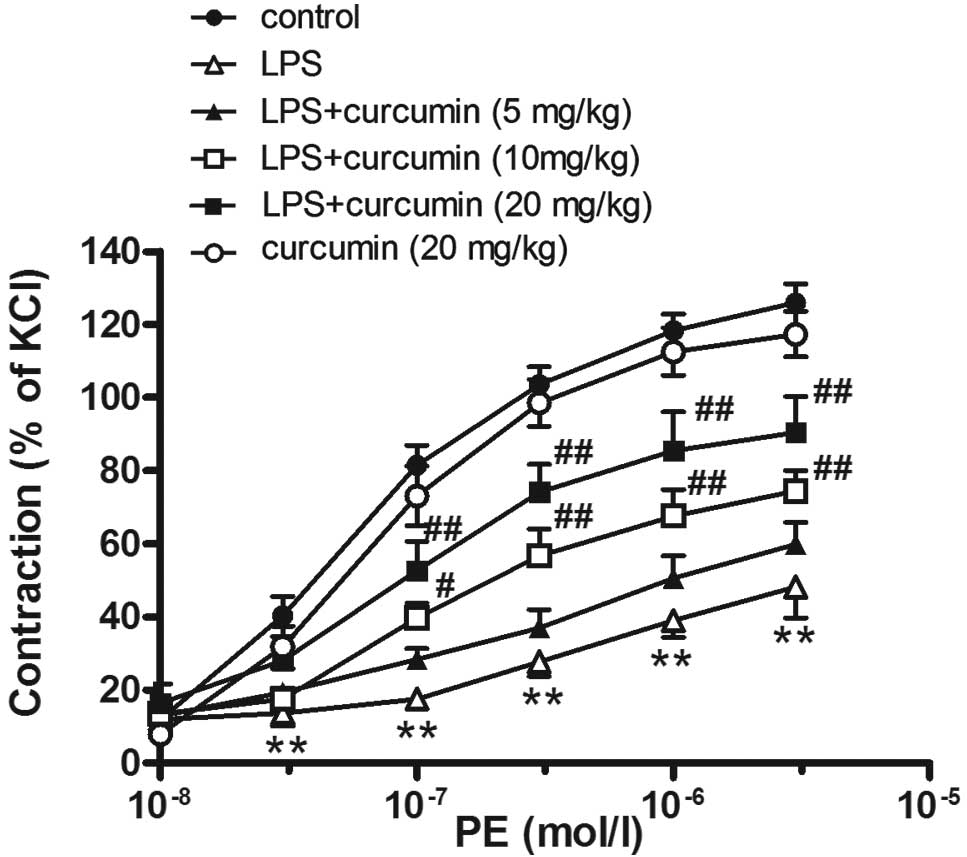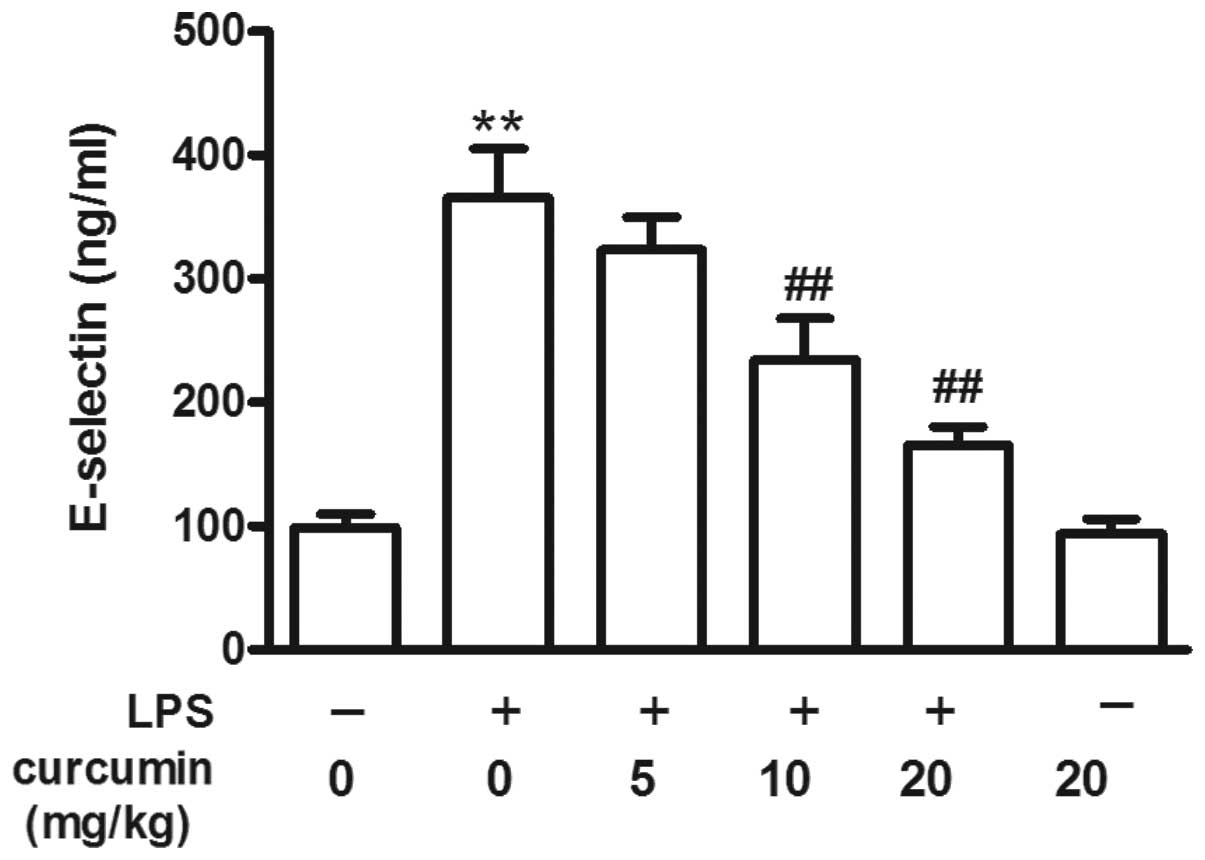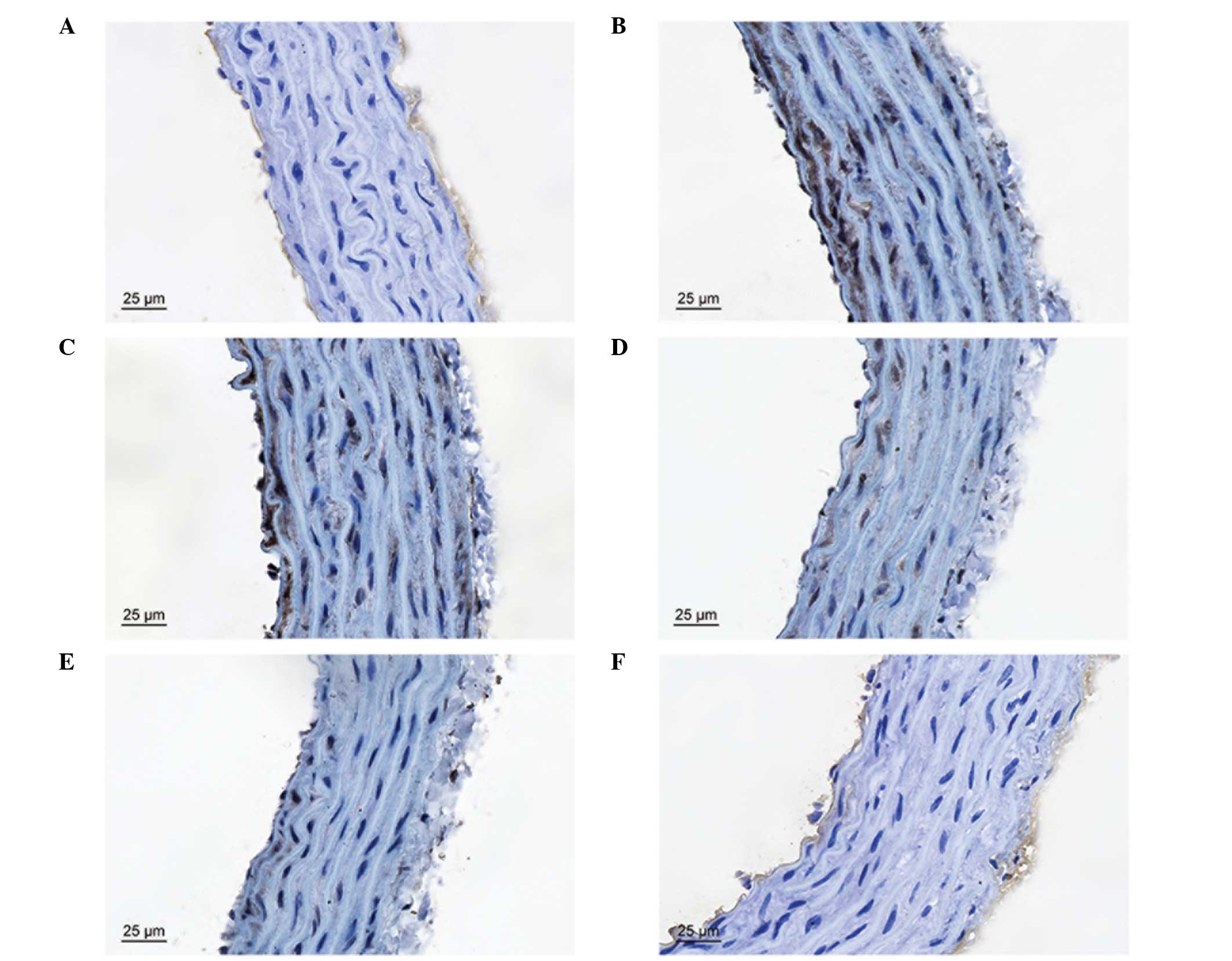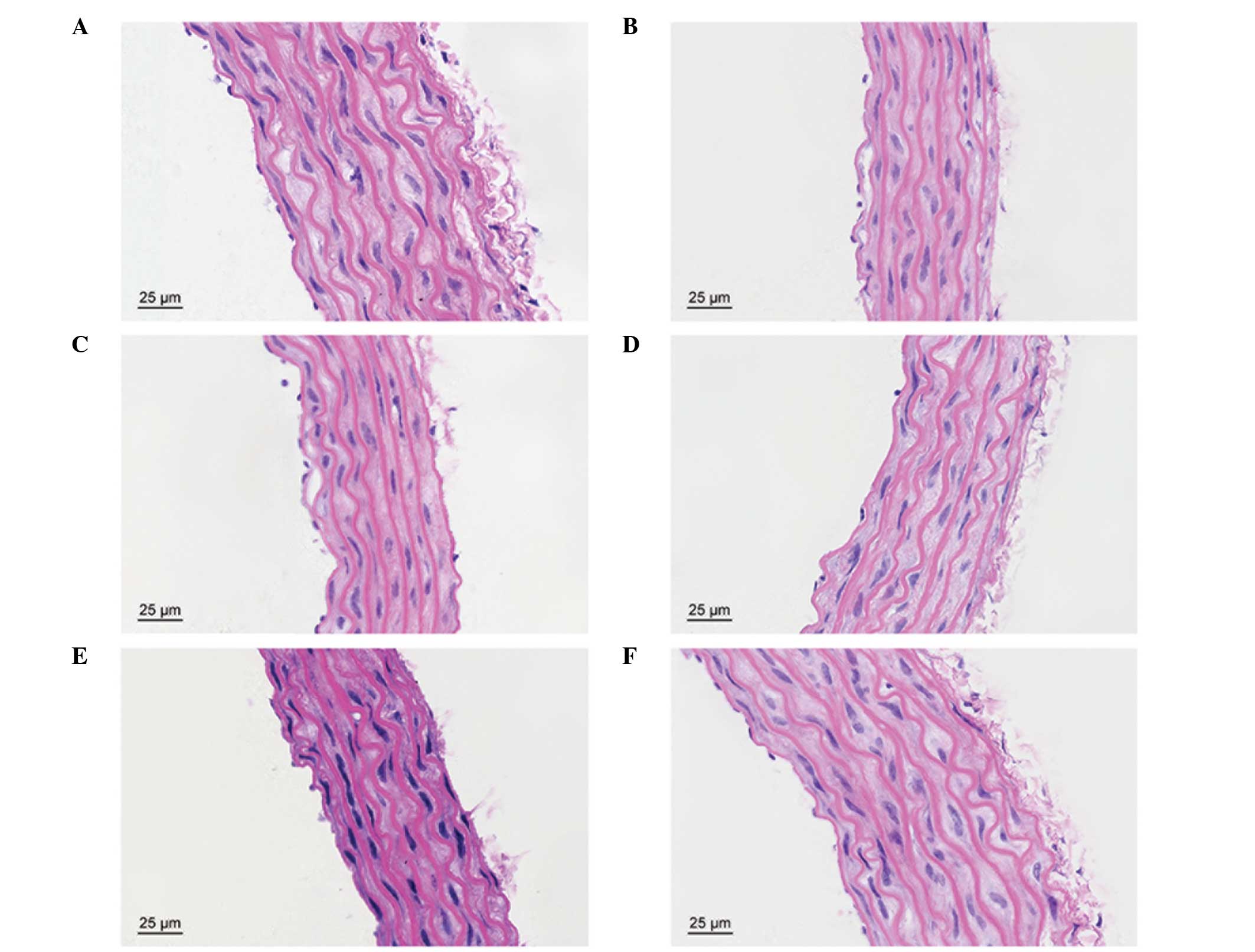|
1
|
Vandijck D, Decruyenaere JM and Blot SI:
The value of sepsis definitions in daily ICU-practice. Acta Clin
Belg. 61:220–226. 2006. View Article : Google Scholar
|
|
2
|
Hotchkiss RS and Karl IE: The
pathophysiology and treatment of sepsis. N Engl J Med. 348:138–150.
2003. View Article : Google Scholar : PubMed/NCBI
|
|
3
|
Felbinger TW, Suchner U and Goetz AE:
Treating patients with severe sepsis. N Engl J Med. 341:56–57.
1999. View Article : Google Scholar : PubMed/NCBI
|
|
4
|
Chen SJ, Wu CC, Yang SN, Lin CI and Yen
MH: Hyperpolarization contributes to vascular hyporeactivity in
rats with lipopolysaccharide-induced endotoxic shock. Life Sci.
68:659–668. 2000. View Article : Google Scholar
|
|
5
|
Jurenka JS: Anti-inflammatory properties
of curcumin, a major constituent of Curcuma longa: a review of
preclinical and clinical research. Altern Med Rev. 14:141–153.
2009.PubMed/NCBI
|
|
6
|
Bengmark S, Mesa MD and Gil A:
Plant-derived health: the effects of turmeric and curcuminoids.
Nutr Hosp. 24:273–281. 2009.PubMed/NCBI
|
|
7
|
Fang XD, Yang F, Zhu L, Shen YL, Wang LL
and Chen YY: Curcumin ameliorates high glucose-induced acute
vascular endothelial dysfunction in rat thoracic aorta. Clin Exp
Pharmacol Physiol. 36:1177–1182. 2009. View Article : Google Scholar : PubMed/NCBI
|
|
8
|
Kim DC, Ku SK, Lee W and Bae JS: Barrier
protective activities of curcumin and its derivative. Inflamm Res.
61:437–444. 2012. View Article : Google Scholar : PubMed/NCBI
|
|
9
|
Stein JJ, Iwuchukwu C, Maier KG and Gahtan
V: Thrombospondin-1-induced vascular smooth muscle cell migration
and proliferation are functionally dependent on microRNA-21.
Surgery. 155:228–233. 2014. View Article : Google Scholar
|
|
10
|
Gawaz M, Dickfeld T, Bogner C,
Fateh-Moghadam S and Neumann FJ: Platelet function in septic
multiple organ dysfunction syndrome. Intensive Care Med.
23:379–385. 1997. View Article : Google Scholar : PubMed/NCBI
|
|
11
|
August P and Suthanthiran M: Transforming
growth factor beta signaling, vascular remodeling, and
hypertension. N Engl J Med. 354:2721–2723. 2006. View Article : Google Scholar : PubMed/NCBI
|
|
12
|
Crawford SE, Stellmach V, Murphy-Ullrich
JE, Ribeiro SM, Lawler J, Hynes RO, Boivin GP and Bouck N:
Thrombospondin-1 is a major activator of TGF-beta1 in vivo. Cell.
93:1159–1170. 1998. View Article : Google Scholar : PubMed/NCBI
|
|
13
|
Yevdokimova N, Wahab NA and Mason RM:
Thrombospondin-1 is the key activator of TGF-beta1 in human
mesangial cells exposed to high glucose. J Am Soc Nephrol.
12:703–712. 2001.PubMed/NCBI
|
|
14
|
Guide for the Care and Use of Laboratory
Animals. National Research Council Committee for the Update of the
Guide for the Care and Use of Laboratory Animals. 8th edition.
National Academies Press; Washington DC, USA: 2011
|
|
15
|
Farmer MR, Roberts RE, Gardiner SM and
Ralevic V: Effects of in vivo lipopolysaccharide infusion on
vasoconstrictor function of rat isolated mesentery, kidney, and
aorta. J Pharmacol Exp Ther. 306:538–545. 2003. View Article : Google Scholar : PubMed/NCBI
|
|
16
|
Yende S, Linde-Zwirble W, Mayr F,
Weissfeld LA, Reiss S and Angus DC: Risk of cardiovascular events
in severe sepsis survivors. Am J Respir Crit Care Med.
189:1065–1074. 2014. View Article : Google Scholar : PubMed/NCBI
|
|
17
|
Coquerel D, Neviere R, Delile E, Mulder P,
Marechal X, Montaigne D, Renet S, Remy-Jouet I, Gomez E, Henry JP,
do Rego JC, Richard V and Tamion F: Gene deletion of protein
tyrosine phosphatase 1B protects against sepsis-induced
cardiovascular dysfunction and mortality. Arterioscler Thromb Vasc
Biol. 34:1032–1044. 2014. View Article : Google Scholar : PubMed/NCBI
|
|
18
|
Sorrentino R, d’Emmanuele di Villa Bianca
R, Lippolis L, Sorrentino L, Autore G and Pinto A: Involvement of
ATP-sensitive potassium channels in a model of a delayed vascular
hyporeactivity induced by lipopolysaccharide in rats. Br J
Pharmacol. 127:1447–1453. 1999. View Article : Google Scholar : PubMed/NCBI
|
|
19
|
Li W, Sun W, Yang CH, Hu HZ and Jiang YH:
Tanshinone II a protects against lipopolysaccharides-induced
endothelial cell injury via Rho/Rho kinase pathway. Chin J Integr
Med. 20:216–223. 2014. View Article : Google Scholar : PubMed/NCBI
|
|
20
|
Higai K, Shimamura A and Matsumoto K:
Amadori-modified glycated albumin predominantly induces E-selectin
expression on human umbilical vein endothelial cells through NADPH
oxidase activation. Clin Chim Acta. 367:137–143. 2006. View Article : Google Scholar : PubMed/NCBI
|
|
21
|
Kneuer C, Ehrhardt C, Radomski MW and
Bakowsky U: Selectins - potential pharmacological targets? Drug
Discov Today. 11:1034–1040. 2006. View Article : Google Scholar : PubMed/NCBI
|
|
22
|
Leeuwenberg JF, Smeets EF, Neefjes JJ,
Shaffer MA, Cinek T, Jeunhomme TM, Ahern TJ and Buurman WA:
E-selectin and intercellular adhesion molecule-1 are released by
activated human endothelial cells in vitro. Immunology. 77:543–549.
1992.PubMed/NCBI
|
|
23
|
Roldán V, Marín F, Lip GY and Blann AD:
Soluble E-selectin in cardiovascular disease and its risk factors.
A review of the literature. Thromb Haemost. 90:1007–1020.
2003.PubMed/NCBI
|
|
24
|
Gerczuk PZ, Breckenridge DG, Liles JT,
Budas GR, Shryock JC, Belardinelli L, Kloner RA and Dai W: An
apoptosis signal-regulating kinase 1 inhibitor reduces
cardiomyocyte apoptosis and infarct size in a rat
ischemia-reperfusion model. J Cardiovasc Pharmacol. 60:276–282.
2012. View Article : Google Scholar : PubMed/NCBI
|
|
25
|
Zhang H, Yu T, Wen L, Wang H, Fei D and
Jin C: Curcumin enhances the effectiveness of cisplatin by
suppressing CD133+ cancer stem cells in laryngeal
carcinoma treatment. Exp Ther Med. 6:1317–1321. 2013.PubMed/NCBI
|
|
26
|
de Pablo R, Monserrat J, Reyes E, Díaz D,
Rodríguez-Zapata M, la Hera Ad, Prieto A and Alvarez-Mon M:
Sepsis-induced acute respiratory distress syndrome with fatal
outcome is associated to increased serum transforming growth factor
beta-1 levels. Eur J Intern Med. 23:358–362. 2012. View Article : Google Scholar : PubMed/NCBI
|
|
27
|
Roy M and Mukherjee S: Reversal of
resistance towards cisplatin by curcumin in cervical cancer cells.
Asian Pac J Cancer Prev. 15:1403–1410. 2014. View Article : Google Scholar : PubMed/NCBI
|
|
28
|
Esemuede N, Lee T, Pierre-Paul D, Sumpio
BE and Gahtan V: The role of thrombospondin-1 in human disease. J
Surg Res. 122:135–142. 2004. View Article : Google Scholar : PubMed/NCBI
|
|
29
|
Baenziger NL, Brodie GN and Majerus PW: A
thrombin-sensitive protein of human platelet membranes. Proc Natl
Acad Sci USA. 68:240–243. 1971. View Article : Google Scholar : PubMed/NCBI
|
|
30
|
DiPietro LA, Nissen NN, Gamelli RL, Koch
AE, Pyle JM and Polverini PJ: Thrombospondin 1 synthesis and
function in wound repair. Am J Pathol. 148:1851–1860.
1996.PubMed/NCBI
|
|
31
|
Iruela-Arispe ML, Bornstein P and Sage H:
Thrombospondin exerts an antiangiogenic effect on cord formation by
endothelial cells in vitro. Proc Natl Acad Sci USA. 88:5026–5030.
1991. View Article : Google Scholar : PubMed/NCBI
|
|
32
|
Hugo C: The thrombospondin 1-TGF-beta axis
in fibrotic renal disease. Nephrol Dial Transplant. 18:1241–1245.
2003. View Article : Google Scholar : PubMed/NCBI
|
|
33
|
Adams JC and Lawler J: The
thrombospondins. Cold Spring Harb Perspect Biol. 3:a0097122011.
View Article : Google Scholar : PubMed/NCBI
|
|
34
|
Chen H, Herndon ME and Lawler J: The cell
biology of thrombospondin-1. Matrix Biol. 19:597–614. 2000.
View Article : Google Scholar : PubMed/NCBI
|
|
35
|
Brunner G and Blakytny R: Extracellular
regulation of TGF-beta activity in wound repair: growth factor
latency as a sensor mechanism for injury. Thromb Haemost.
92:253–261. 2004.PubMed/NCBI
|
|
36
|
Saltzman AK, Olson TA, Mohanraj D, Carson
LF and Ramakrishnan S: Prevention of postoperative adhesions by an
antibody to vascular permeability factor/vascular endothelial
growth factor in a murine model. Am J Obstet Gynecol.
174:1502–1506. 1996. View Article : Google Scholar : PubMed/NCBI
|
|
37
|
Zhang XM, Shi PH, Cao SH, Yu HJ, Azad J
and Ling SC: Expression changes of transforming growth factor-beta1
and thrombospondin-1 in cavernous tissues of diabetic rats. Urol
Int. 84:221–225. 2010. View Article : Google Scholar : PubMed/NCBI
|
|
38
|
McMaken S, Exline MC, Mehta P, Piper M,
Wang Y, Fischer SN, Newland CA, Schrader CA, Balser SR, Sarkar A,
Baran CP, Marsh CB, Cook CH, Phillips GS and Ali NA:
Thrombospondin-1 contributes to mortality in murine sepsis through
effects on innate immunity. PLoS One. 6:e196542011. View Article : Google Scholar : PubMed/NCBI
|
|
39
|
Bone RC: Sir Isaac Newton, sepsis, SIRS,
and CARS. Crit Care Med. 24:1125–1128. 1996. View Article : Google Scholar : PubMed/NCBI
|
|
40
|
Daniel C, Wiede J, Krutzsch HC, Ribeiro
SM, Roberts DD, Murphy-Ullrich JE and Hugo C: Thrombospondin-1 is a
major activator of TGF-beta in fibrotic renal disease in the rat in
vivo. Kidney Int. 65:459–468. 2004. View Article : Google Scholar : PubMed/NCBI
|
|
41
|
Kim HJ, Park SY, Park OJ and Kim YM:
Curcumin suppresses migration and proliferation of Hep3B
hepatocarcinoma cells through inhibition of the Wnt signaling
pathway. Mol Med Rep. 8:282–286. 2013.PubMed/NCBI
|
|
42
|
Redondo S, Santos-Gallego CG, Ganado P,
García M, Rico L, Del Rio M and Tejerina T: Acetylsalicylic acid
inhibits cell proliferation by involving transforming growth
factor-beta. Circulation. 107:626–629. 2003. View Article : Google Scholar : PubMed/NCBI
|
|
43
|
Ruiz E, Redondo S, Gordillo-Moscoso A and
Tejerina T: Pioglitazone induces apoptosis in human vascular smooth
muscle cells from diabetic patients involving the transforming
growth factor-beta/activin receptor-like kinase-4/5/7/Smad2
signaling pathway. J Pharmacol Exp Ther. 321:431–438. 2007.
View Article : Google Scholar : PubMed/NCBI
|
|
44
|
Murphy-Ullrich JE and Poczatek M:
Activation of latent TGF-beta by thrombospondin-1: mechanisms and
physiology. Cytokine Growth Factor Rev. 11:59–69. 2000. View Article : Google Scholar : PubMed/NCBI
|
|
45
|
Garcia-Lazaro JF, Thieringer F, Lüth S,
Czochra P, Meyer E, Renteria IB, Galle PR, Lohse AW, Herkel J and
Kanzler S: Hepatic over-expression of TGF-beta1 promotes
LPS-induced inflammatory cytokine secretion by liver cells and
endotoxemic shock. Immunol Lett. 101:217–222. 2005. View Article : Google Scholar : PubMed/NCBI
|
|
46
|
Bechara RI, Pelaez A, Palacio A, Joshi PC,
Hart CM, Brown LA, Raynor R and Guidot DM: Angiotensin II mediates
glutathione depletion, transforming growth factor-beta1 expression,
and epithelial barrier dysfunction in the alcoholic rat lung. Am J
Physiol Lung Cell Mol Physiol. 289:L363–L370. 2005. View Article : Google Scholar : PubMed/NCBI
|
|
47
|
Xu F, Lin SH, Yang YZ, Guo R, Cao J and
Liu Q: The effect of curcumin on sepsis-induced acute lung injury
in a rat model through the inhibition of the TGF-beta1/SMAD3
pathway. Int Immunopharmacol. 16:1–6. 2013. View Article : Google Scholar : PubMed/NCBI
|
|
48
|
Yoshida H, Okumura N, Nishimura Y,
Kitagishi Y and Matsuda S: Turmeric and curcumin suppress
presenilin 1 protein expression in Jurkat cells. Exp Ther Med.
2:629–632. 2011.PubMed/NCBI
|
|
49
|
Hsu YC, Chen MJ, Yu YM, Ko SY and Chang
CC: Suppression of TGF-β1/SMAD pathway and extracellular matrix
production in primary keloid fibroblasts by curcuminoids: its
potential therapeutic use in the chemoprevention of keloid. Arch
Dermatol Res. 302:717–724. 2010. View Article : Google Scholar : PubMed/NCBI
|



















